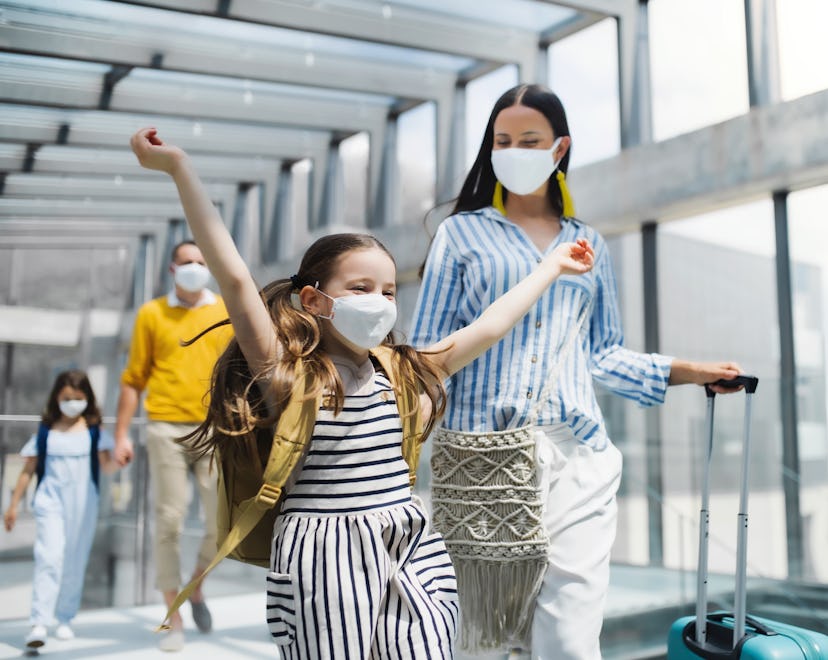Life

5 Expert-Approved Tips For Keeping Your Family Safe During Summer Travel
It’s the question on everyone’s mind these days: How soon can we go on vacation?
After over a year spent in quarantine, many of us are more eager than ever to hit the road and get out of town, but we still want to do it safely, especially since kids under 12 aren’t currently eligible to receive vaccines. And physical health isn’t the only thing to consider: Kids’ mental health is also a concern.
“We’ve seen an increase in anxiety and depression in children, and it’s not hard to understand why,” Jesspreet Gowan, a pediatrician at Pediatric Associates with Stanford Children’s Health tells Romper. “Parents are feeling anxious. They’re staying home and not able to be with peers. This was going to happen, right?”
While travel doesn’t make up for the emotional challenges of the pandemic, Dr. Gowan sees it as one way that families can bond and begin the recovery process. “I hope that families are able to experience some trips this summer, and do so in a way that makes them comfortable and safe,” she says. “We’re finally seeing some consistent positive news that will allow parents and kids to venture out again and enjoy some time together.”
Romper teamed up with Stanford Children’s Health to talk to Dr. Gowan about the best ways to stay healthy while traveling this summer. Read on for her recommendations and head into that much-needed vacation with confidence.
1. Stay Flexible
As Dr. Gowan puts it, “Things have changed rapidly since the beginning of the pandemic ... this is a very liquid situation, and what I tell you today could be very different from what I’m going to tell you in a few weeks.”
For this reason, she recommends keeping your vacation plans nimble while staying up to date with as much data as possible before making a decision about where to go, stay, or visit. Make a list of places you’re interested in, and then do your research by reading reviews on lodging, restaurants, and attractions to see how they’re handling the pandemic.
And if an establishment doesn’t meet your standards for cleanliness or COVID policies? “Don’t be afraid to speak up,” Dr. Gowan emphasizes. “Don’t stay in an uncomfortable situation.”
2. Know Your Family
Maybe you have older kids who have already been vaccinated, or perhaps you’re still in the toddler phase. Chances are, your vacation plans will look a little different depending on your family. “The younger the child, the less likely they are to wear masks or respect social distancing,” says Dr. Gowan. “You have to look at your family independently and ask, how consistent are my kids with following guidelines?”
According to Dr. Gowan, “The best mask is the one that is going to stay on your face. If you put a double mask on a kid but they are constantly messing with it and touching surfaces and then touching it, that’s not going to help you.”
3. Steer Clear Of Crowds
No matter how old your kids are, she suggests avoiding crowds as much as you can. “The proximity to others is what’s going to really increase your risk of coming into contact with COVID,” Dr. Gowan tells Romper. Outdoor restaurants and other venues are always safest, especially for unvaccinated individuals, and it’s always a good idea to wash your hands and limit your time inside communal spaces like bathrooms as much as possible.
4. Come Prepared
If you need to use mass transportation like planes or trains, Dr. Gowan recommends heading into the situation with a plan. “I would carry my disinfecting wipes and wipe down wherever I’m going to be sitting, try to find a seat near some kind of ventilation, and minimize movement throughout the journey.”
For overnight stays in rental properties, ensure cleanliness by bringing your own sheets and towels, and always making sure to wipe down high traffic areas like bathrooms and doorknobs with antibacterial wipes.
5. Communicate Clearly, Not Anxiously
Dr. Gowan recommends having open and honest conversations with your kids about upcoming trips and what they might encounter, especially since changes can be uncomfortable for many children. “You can explain that some people wear masks and some people don't.” But be careful that the seriousness of this subject doesn’t provoke fear or anxiety. “It shouldn't be, ‘you're going to get sick if you don't do this.’ We don't want to make it a fearful situation, but you just want to gently explain, ‘this is our family's decision.’”
At the end of the day, Dr. Gowan encourages families not to lose sight of why you’re going on vacation in the first place. “The important thing to me is that families find ways to bond and get time away from school and work where they can be together,” Dr. Gowan says. “Find that quality time, whatever that is. I don’t think it necessarily requires travel, but if you can, and you can do it in a way that you’re comfortable, I think it allows a nice reprieve for families.”